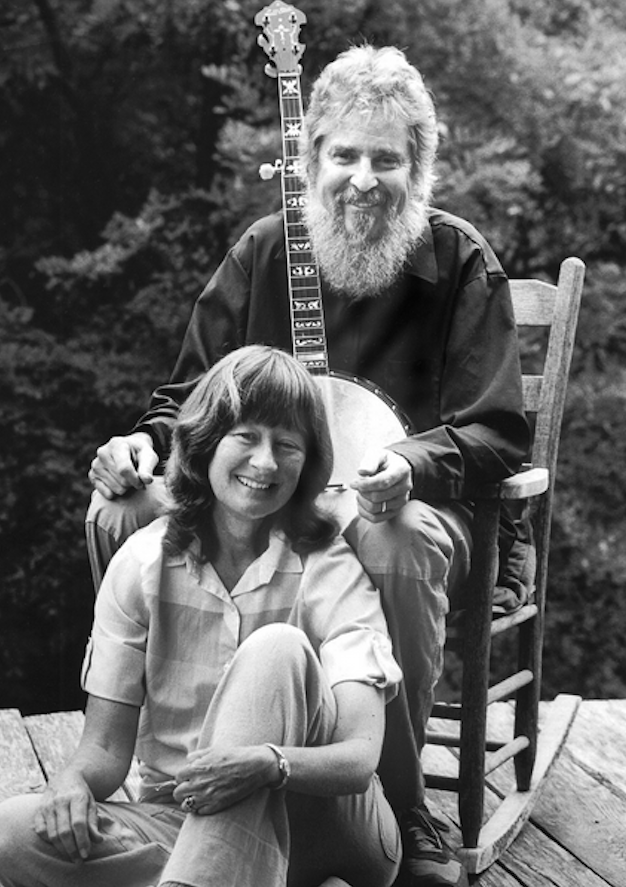By Lynn Burnett
In the early fifties, Guy Carawan was an aspiring folk musician, inspired both by Southern folk music and songs from the labor movement. He visited the Highlander Folk Center for the first time in 1953. Located in the Appalachian Mountains of Tennessee, Highlander had been a training ground for labor organizing since the early days of the Great Depression. By the time Carawan arrived, the center was beginning to focus on civil rights organizing as well: it was one of the few integrated Southern spaces where such trainings occurred. In 1959, Guy returned to Highlander to lead the music program there and continue the legacy of Zilphia Horton, who had collected movement music from across the South and used it to support movement organizers. In Carawan’s words, “My job would be to help get people singing and sharing their songs. When someone began to sing, I’d back them up softly on my guitar so they’d get courage and keep going. Sometimes in sharing a song, people find bonds between themselves that they never knew they had.”
In 1960, Highlander hosted a workshop for the sit-in students. Guy Carawan introduced the students to a union organizing song that was an adaptation of a Black spiritual: “We Shall Overcome.” As one of Martin Luther King’s chief organizers C.T. Vivian remembers, “I don’t think we had ever thought of spirituals as movement material. When the movement came up, we couldn’t apply them.” Guy inspired C.T. Vivian, as well as the sit-in students, to “take the music out of our past and apply it to the new situation, to change it so it really fit . . . The first time I remember any change in our songs was when Guy came down from Highlander.” Once the sit-in students heard spirituals adapted for a movement context (as had been done earlier in labor movement songs), they ran with it, and adaptions flourished within the movement. Guy Carawan always emphasized that in his music workshops, the students had discovered a concept, originally developed by Black labor organizers. He hadn’t created it. But by working at Highlander, with it’s commitment to fusing labor and civil rights struggles as well as to building movement culture, Guy helped facilitate the transmission of the concept into the civil rights movement.
At Highlander, Guy met the woman who became the love of his life. Candie was a young White woman, who had been arrested during the Nashville sit-ins. While in the segregated jails, Candie recalled that “The only connection we had with the others was the music.” Whether at sit-ins or marches or in jail, the music served both to unite the people as a group, and to fortify the spirit. Experiencing this gave Candie a profound appreciation for the power of song. Guy and Candie soon married, and together the Carawans traversed the South throughout the 60s, hosting workshops and bringing the music of the movement to as many communities as possible. Their workshops also supported people in the movement in creating their own music to meet their own organizing needs.
For decades, the Carawans worked to record and preserve the music that had come out of the civil rights and other social justice movements. Guy continued to be the musical director of Highlander for 30 years. He passed away in 2015. Candie continues her culture-building movement work with Highlander to this very day.
Additional Resources
Books
Guy and Candie Carawan:
- Sing for Freedom: The Story of the Civil Rights Movement Through Its Songs.
- Ain’t You Got a Right to the Tree of Life? The People of Johns Island South Carolina—Their Faces, Their Words, and Their Songs.
- Voices From the Mountains.
Articles
Association for Cultural Equity: Profile of Guy Carawan.
Field Trip South: In Tribute to Guy Carawan.
Cate Fosl (Anne Braden’s biographer): Guy Carawan (1927–2015).
Maggie Lewis: Guy and Candie Carawan; Song leaders for social change.
National Council of Elders: Candie Carawan.
NYT Obituary: Guy Carawan Dies at 87; Taught a Generation to Overcome, in Song.
SNCC Digital Gateway: Guy & Candie Carawan.
Wikipedia entry on Candie Carawan.
Wikipedia entry on Guy Carawan.
Video
Candie Carawan: Building the Beloved Community Through Song.
Library of Congress: Candie Carawan and Guy Hughes Carawan oral history interview.
